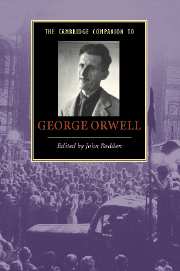Book contents
- Frontmatter
- 1 A political writer
- 2 Orwell and the biographers
- 3 Englands His Englands
- 4 The truths of experience: Orwell’s nonfiction of the 1930s
- 5 The fictional realist: novels of the 1930s
- 6 Orwell’s essays as a literary experience
- 7 ‘My country, right or left’: Orwell’s patriotism
- 8 Orwell and the British Left
- 9 Orwell, anti-Semitism and the Holocaust
- 10 Orwell, Socialism and the Cold War
- 11 Animal Farm: history as fable
- 12 Nineteen Eighty-Four: context and controversy
- 13 Orwell, the academy and the intellectuals
- 14 Orwell for today’s reader: an open letter
- 15 George Orwell: a bibliographic essay
- 16 Why Orwell still matters
- Further reading
- Index
2 - Orwell and the biographers
Published online by Cambridge University Press: 28 July 2007
- Frontmatter
- 1 A political writer
- 2 Orwell and the biographers
- 3 Englands His Englands
- 4 The truths of experience: Orwell’s nonfiction of the 1930s
- 5 The fictional realist: novels of the 1930s
- 6 Orwell’s essays as a literary experience
- 7 ‘My country, right or left’: Orwell’s patriotism
- 8 Orwell and the British Left
- 9 Orwell, anti-Semitism and the Holocaust
- 10 Orwell, Socialism and the Cold War
- 11 Animal Farm: history as fable
- 12 Nineteen Eighty-Four: context and controversy
- 13 Orwell, the academy and the intellectuals
- 14 Orwell for today’s reader: an open letter
- 15 George Orwell: a bibliographic essay
- 16 Why Orwell still matters
- Further reading
- Index
Summary
Days before dying, on 21 January 1950, George Orwell inserted a clause in his will asking for no biography. Biographers of Orwell have therefore often been accused of disregarding a dying man's wishes. However, viewing this final request in the context of Orwell's life raises the question of its authenticity. Was it made freely or under the pressure of circumstances?
There is no evidence that Orwell was 'anti-biography'. On the contrary, it is perfectly clear from what he wrote, that he valued literary biographies as means to understanding authors' works. His first published review, of Lewis Mumford's life of Herman Melville, shows him identifying strongly with a writer whose career was as troubled and penurious as his own. Throughout his life he read biographies avidly, in 1934 himself offering to write a centenary biography of Mark Twain. In 1942, he called for a much-needed life of Joseph Conrad, in 1945 for 'a definitive one' of Conan Doyle and in 1948 for one of George Gissing. In 1946, shortly after Animal Farm appeared, he urged his publisher, Fredric Warburg, to bring out Trotsky's biography of Stalin. He readily supplied autobiographical details to publishers, critics and writers' directories, cooperated happily with biographers of others, and approved his friend George Woodcock's plan to make him the subject of a biographical essay.
- Type
- Chapter
- Information
- The Cambridge Companion to George Orwell , pp. 12 - 27Publisher: Cambridge University PressPrint publication year: 2007

